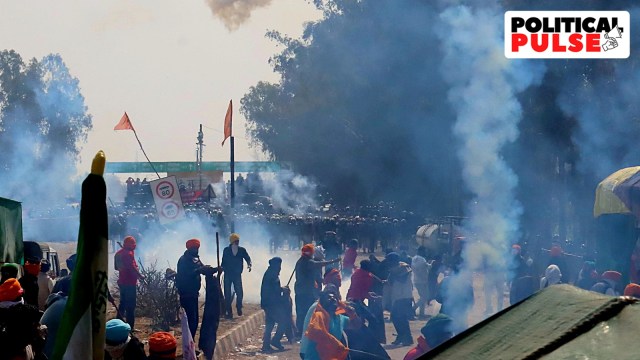Hours after announcing action would be taken against farmer leaders under the NSA, the Haryana Police on Friday morning reversed its decision. Officials also clarified that the police had not yet invoked the NSA against the farm leaders and had only “initiated the process”.

Inspector General of Police (Ambala) Sibash Kabiraj said, “This is to clarify that the matter of invoking provisions of the National Security Act on a few farm union leaders in the Ambala district has been reconsidered and it has been decided that the same will not be invoked.”
A senior official in the state government led by Chief Minister Manohar Lal Khattar admitted that invoking the NSA against the farmer leaders would have proved “counterproductive” and invited outrage not only from the farmers but also other sections of society. “In such a scenario, we took a prompt decision on it,” the official said.
The announcement to invoke the NSA came just a day after a 22-year-old agitating farmer from Punjab died following a confrontation with the Haryana Police.
Farmer leaders and other activists saw the Haryana government’s NSA move as an attempt to suppress their voices. Bharatiya Kisan Union (Chaduni) leader Rakesh Bains alleged that such steps were a “sign of dictatorship”. “Such atrocities are aimed at stopping everyone from undertaking an agitation for their rights,” Bains said.
Another farmer leader from Jind, Azad Singh Palwa, said farmers will not be deterred by such steps. “We will fight till our demand for a legal guarantee of minimum support price (MSP) is accepted,” he said.
Story continues below this ad
Agriculture expert Devinder Sharma, criticising the use of the NSA, said, “If we are using the NSA against farmer leaders today, tomorrow the message to all unions and associations would be that if they try to raise their voices or come out on the streets, they would have an NSA against them too. What kind of democratic tradition is this?”
“Why are (authorities) applying all these high-handed approaches to silence the farmers. On one hand, we say the farmers are part of our family. Which family has a fortification around their house? Which family uses teargas shells around their house?” Sharma added.
Following the death of a farmer and serious injuries to several others in the alleged police action at the Haryana borders after Punjab farmers began their ‘Dilli Chalo’ march towards the national capital on February 13, unrest among the farmers in Haryana, too, has grown significantly.
Ahead of the Lok Sabha polls, the Haryana government seemingly does not want to further upset the agitating farmers with any extreme measures. The government also does not want a large mobilisation of the Haryana farmers, especially when thousands of Punjab farmers are already camping at its borders.
Story continues below this ad
The government’s cautious approach was evident in its decision to release all 16 farmer leaders and activists just hours after their detention in the Hisar district on Friday. The detentions had followed an announcement from the Haryana farmers to move towards Khanauri along the Punjab-Haryana border. The police had used teargas shells and water cannons to disperse hundreds of farmers.
During farmers’ agitation against the three controversial central farm laws in 2020-21, the protesters had prevented leaders from the BJP and its ally, the Deputy CM Dushyant Chautala-led Jannayak Janta Party (JJP), from entering several Haryana villages. The ruling alliance doesn’t want a similar scenario ahead of the parliamentary polls slated for April-May. The Haryana Assembly polls are also due in October this year.
As of now, the farm stir in Haryana is limited to only a few areas in the state but the protesters’ demands – an MSP law and debt waiver, among others – have found a resonance in the state’s rural communities, farmers groups said.
With the farmer agitation having already taken centre stage in the region, its continuation could give the Opposition Congress an advantage ahead of the polls.
Story continues below this ad
Congress MLA Varun Chaudhary alleged that by invoking the NSA, the government was trying to “kill the agitation”. “In a democracy, everyone has the right to raise his or her voice. But why are they not allowing the farmers to move to Delhi?” he said.
The BJP-JJP government in Haryana has already initiated efforts to assuage the farming community. While presenting the state Budget on Friday, Khattar, who also holds the finance portfolio, announced a waiver of interest and penalties on crop loans to farmers who pay the principal amount by May 31.
Praveen Attrey, the CM’s media secretary, said, “In Friday’s Haryana Budget, the government has announced waiving off interest and penalty of nearly Rs 1,750 crore on farm loans. This is almost equivalent to the principal amount (Rs 2,100 crore) of these crop loans. The government on Friday also announced waiving of irrigation water aabyana (charges), which has been charged since the days of the British regime, for agricultural purposes.”
On the allegations of use of force against the agitating farmers, Attrey insisted that even the Punjab and Haryana High Court stated that it is the duty of the state to maintain law and order. “The Haryana government too is committed to maintaining law and order,” he said.

































